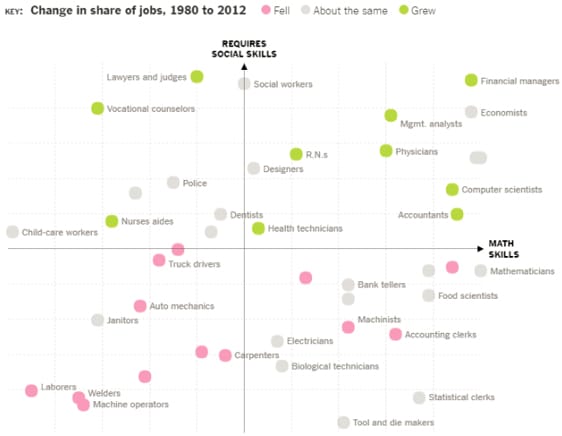How do you future proof your student’s skills and knowledge when nobody can be certain what jobs will be available? To give you an idea; we no longer need the bowling alley pinsetter, human alarm clocks (“Knocker-up“), ice cutters, lamplighters, or switchboard operators which technology and economic conditions has so readily replaced today.
A recent study by the World Economic Forum predicts that approximately 5 million jobs will be lost before 2020 as technology replaces the need for human workers. Millions of workers today that don’t account for the possible future where their current job is automated (and prepare accordingly) are likely to find their jobs redundant.
What does the future require of us?
It is not all doom and gloom. Researchers like David Deming (Associate Professor of Education and Economies at Harvard University) argue that soft skills such as sharing and negotiating will be crucial alongside a strong technical understanding of theories and practice that are traditionally taught in current courses. As a part of his research, Deming has mapped the changing needs of employers and in doing so identified the key skills that will be required to thrive in the job market in the future.

Source: David Deming, Harvard University
What do we take away from this?
Specific roles which relied heavily on one type of skill over another (hard vs soft) are not the way of the future. In recent years, jobs which only required mathematical skills have been automated whereas jobs which rely solely on social skills tend to be poorly paid. To ensure students take solid and future-proof skills from their time at an education institution they need to be taught both hard and soft skills.
How?
Business simulations provide students with the opportunity to engage and expand their skill set. Not just the hard or the soft but encourage students to combine the two. Recent research has shown that business simulations are effective at developing critical thinking and analytical skills as well as improving a students ability to negotiate, communicate and work within a team. Over the past 20 years various researchers have conducted research into the benefits of business simulations.
There are many forms of this; marketing simulations, business simulations, management accounting simulations, and advertising simulations. If you’d like to learn more about future proofing your student’s skills through business simulations then click here.
